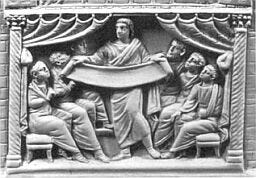Did a Woman Write Luke-Acts?
The Gospel of Luke and its sequel, Acts, are traditionally thought to have been written by a chap called Luke. But what is the basis of this attribution?
Towards the end of Acts, we find a number of ‘we’ passages in which the author inserts himself into the narrative alongside Paul. In the tradition, this figure is identified as Luke, who is named in other sources as a companion of Paul.1
But not all scholars today think that Luke wrote the two-volume work. One reason why they doubt Lukan authorship is because his name does not appear in relation to the Gospel until the late Second Century with Irenaeus. This was around the time the Gospels seem to have accrued their uniform titles: ‘The Gospel according to X.’
With Mark, Matthew and John, there is some evidence that these authors wrote something early on in the tradition. (I explore some of that evidence here and here.) But with Luke, there is no pre-existing tradition that he had written Luke-Acts.

Consider the arch-heretic, Marcion, who highly favoured Luke in his canon of the New Testament. He wrote in the early second century but did not assign an author to the work. We see this in a passage from Tertullian:
“[Marcion] does not assign an author to his gospel, as if he was not allowed to attach a title on something on which it was no crime to destroy the body itself. And here I may now take a stand, and argue that a work should not be recognised that does not hold its head up, that shows no constancy, that supplies no promise of trustworthiness from the completeness of its title and the due indication of its author.” (Marc. 2:4:3.)
Marcion’s lack of attribution of the Gospel to Luke is particularly surprising, given that Marcion cited from two texts which mention the travelling companion: Colossians and Philemon. If Marcion knew that Luke was the author of his favourite Gospel, this would have lent his writing a powerful apostolic authority.

How, then, did Luke-Acts eventually to come to be associated with Luke?
It may have been through mining the sources and tradition for clues. We know that Acts has a number of ‘we’ passages. This would have signalled to its readers that a travelling companion of Paul lay behind the work. And Philemon and Colossians mention Luke, a travelling companion of Paul, three times.
Putting two and two together, the tradition easily found its author.


